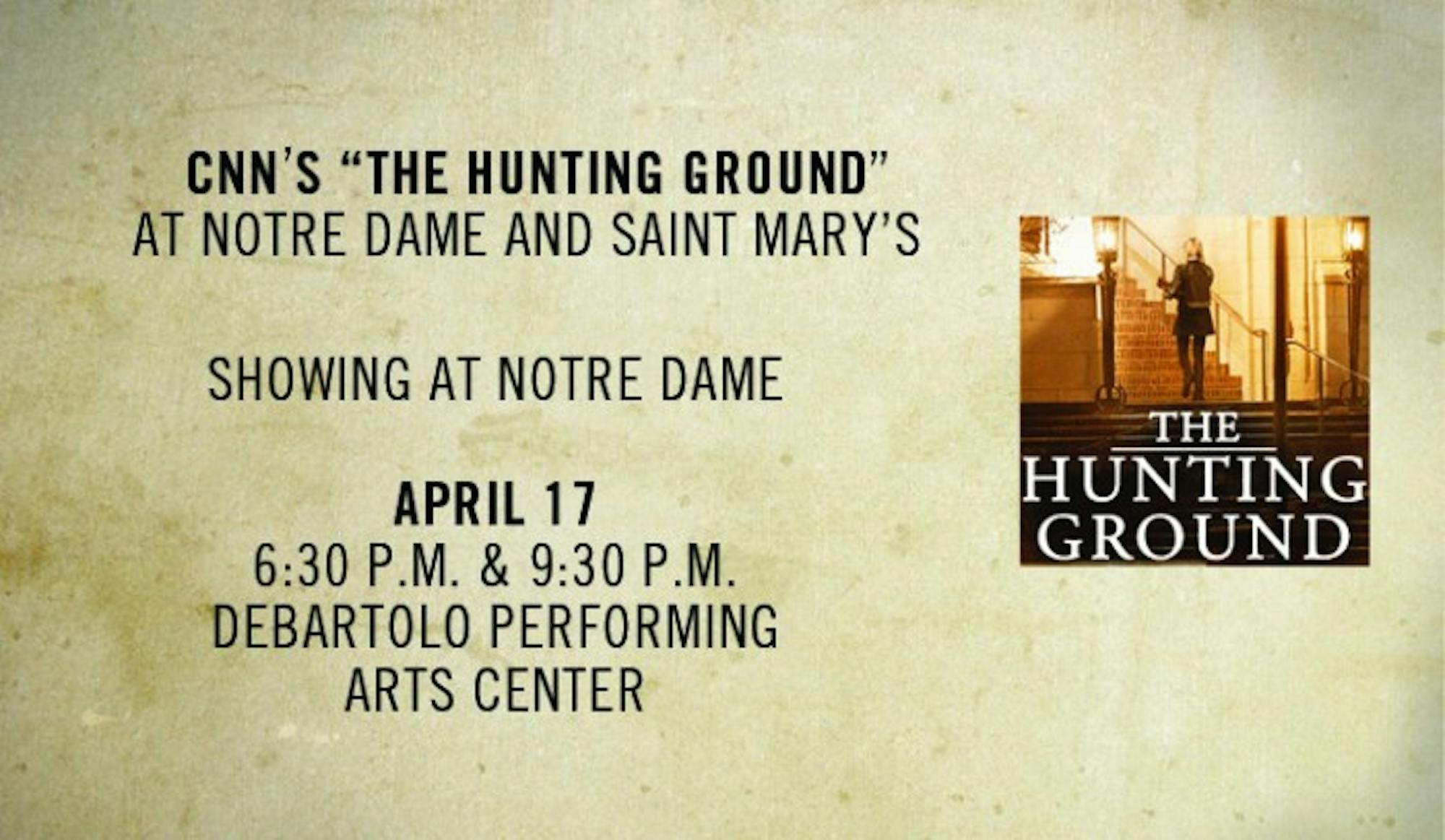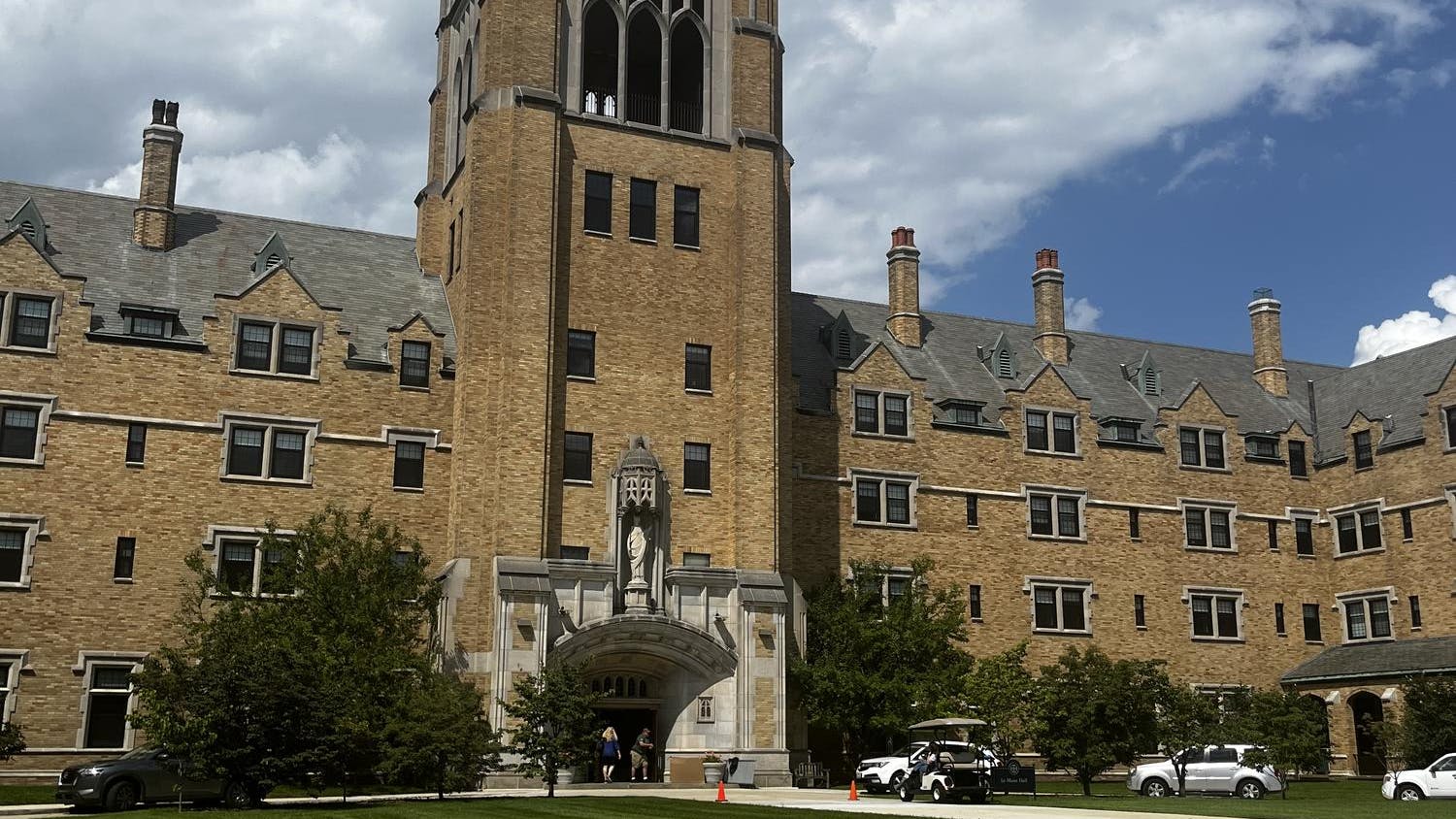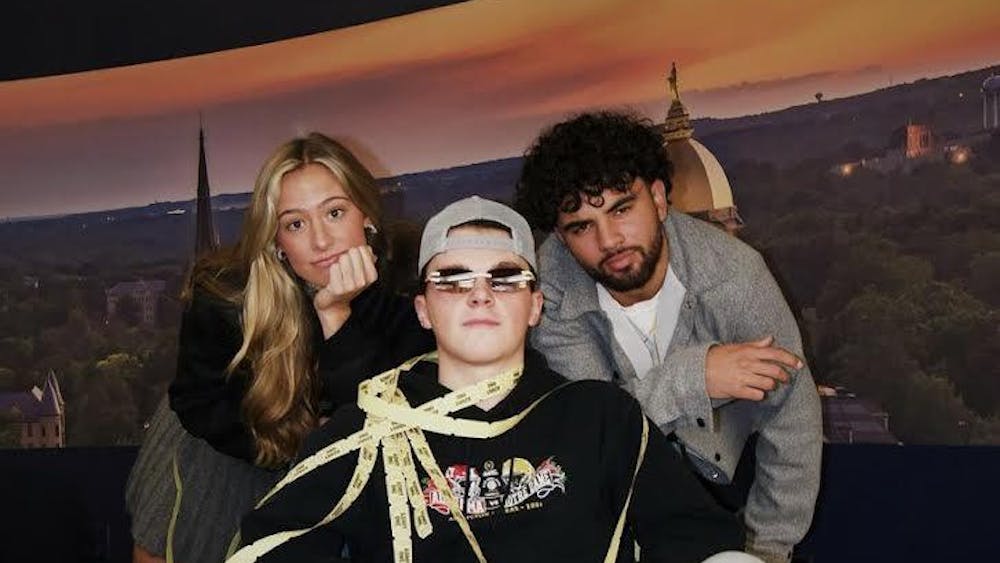The Belles Against Violence Office (BAVO) sponsored a showing of and panel discussion on the CNN documentary “The Hunting Ground” on Thursday evening in O’Laughlin Auditorium on Saint Mary's campus.
Saint Mary's College President Carol Ann Mooney introduced the film, which deals with sexual assaults on college campuses including Saint Mary's and Notre Dame.
“The film promotes action and an important message and voices that need to be heard,” Mooney said. “I am very proud that two Saint Mary’s women and a Saint Mary’s father were willing to be featured.”
In addition to Saint Mary's and Notre Dame, several other schools were also featured in the documentary, including University of Southern California, Harvard, Dartmouth, North Carolina and Yale, among others.
Lt. Pat Cottrell, a retired official of Notre Dame Security Police (NDSP), was featured in the documentary to talk about sexual assaults on Notre Dame’s campus specifically.
Cottrell said NDSP preferred to keep its crime statistics as low as possible.
Cottrell said this problem was magnified as his bosses would say they had empathy for victims of crimes but did not really support them. Additionally, Cottrell said NDSP could not contact any athlete or athletic staff directly, regarding of any accusation, without first going through University officials.
Paul Browne, vice president for public affairs and communications for the University, said Cottrell's assertion was false.
“‘The Hunting Ground’ ... was wrong in unsupported and inaccurate assertions that the University sought to suppress crime statistics and shield athletes from investigators," he said in a statement.
Rachel Hudak, a former Saint Mary’s student, was featured in the documentary regarding a sexual assault that allegedly happened on Notre Dame’s campus. Hudak said Mooney disregarded her sexual assault complaint in a meeting.
Tom Seeberg, father of Lizzy Seeberg, a former Saint Mary’s student who committed suicide after an alleged sexual assault by a Notre Dame football player, spoke on his daughter's behalf.
Seeberg said Lizzy reported the alleged assault the day after it happened and received a threatening text from another football player.
Mooney spoke after the film and said students may wonder why she did not agree to be interviewed by CNN for the movie.
“I hope you know that student privacy is of the utmost importance,” Mooney said. “You may also be wondering about Rachel’s comment, and I remember our conversation very differently than she does. It is through her pain that she remembers. I am, and was then, very sorry I cannot take her pain away.”
Response to the film
Five panelists spoke after the documentary, including Karen Johnson, vice president of Student Affairs at the College, Connie Adams, director of BAVO, Stacy Davis, chair of the Gender and Women's Studies department, senior Payton Moore and Brian Young, commander of the St. Joseph County Special Victims Unit.
Adams said two key areas stand out most to her after watching the documentary. The first area, she said, was the theme of survivors that feel alone.
“We as a community can respond in a compassionate way,” Adams said.
The second theme in the film is activism, she said.
“They are so many ways we can take on this issue,” Adams said. “We can really assume that call to action.”
Davis said there was a horrible repetitiveness in the documentary of schools covering up sexual assaults.
“My first response was anger,” Davis said. “Then I realized you all have an incredible opportunity because all schools want to get paid and stay open. It was a good thing that [the documentary] shamed schools, so that you [students] are treated fairly.”
Reporting sexual assault
Johnson said the number of reported campus assaults depends on where the assault is reported. She said there are between four to six reports of sexual assaults annually that come across her desk in Student Affairs.
“If they report at Notre Dame, our office doesn’t get that information,” Johnson said. “It’s really important to know that we work with the Title IX coordinator at Notre Dame, and that’s as far as we can work with them. What we do here is to provide as much support regardless of where they were assaulted. Things can change if we all work together to make that happen.”
Adams said it is important to listen to the student’s needs through the healing process.
“When we're talking about violence, we’re talking about taking power away,” Adams said. “The support has to be about getting that power back, and the support we have on campus is to empower the students.”
As an alumna of Saint Mary’s, Adams said she has seen growth returning to the campus as the director of BAVO. The office began in the spring of 2010, and it has continued to evolve and grow since then, especially in regards to student activism, she said.
Young said he was struck by the lack of compassion on the part of law enforcement in the documentary. He said St. Joseph County SVU will work with a student as soon as an incident is reported to the department.
“We work with the victim and want to be considerate to what has happened and certainly compassionate towards what she’s going through,” Young said.
Johnson said she also works closely the Title IX coordinator at Notre Dame.
“We can’t dictate to Notre Dame what the outcome of a case should be, but we can only support our students. The hard part for all of us is that we are two separate legal entities, and therefore the best I can do is meeting and going through the processes,” she said.
The panel concluded without answering all audience questions. Moderator Frances Kominkiwicz said all questions submitted by members of the audience will be answered in a written document on the BAVO webpage and sent out in an email.













